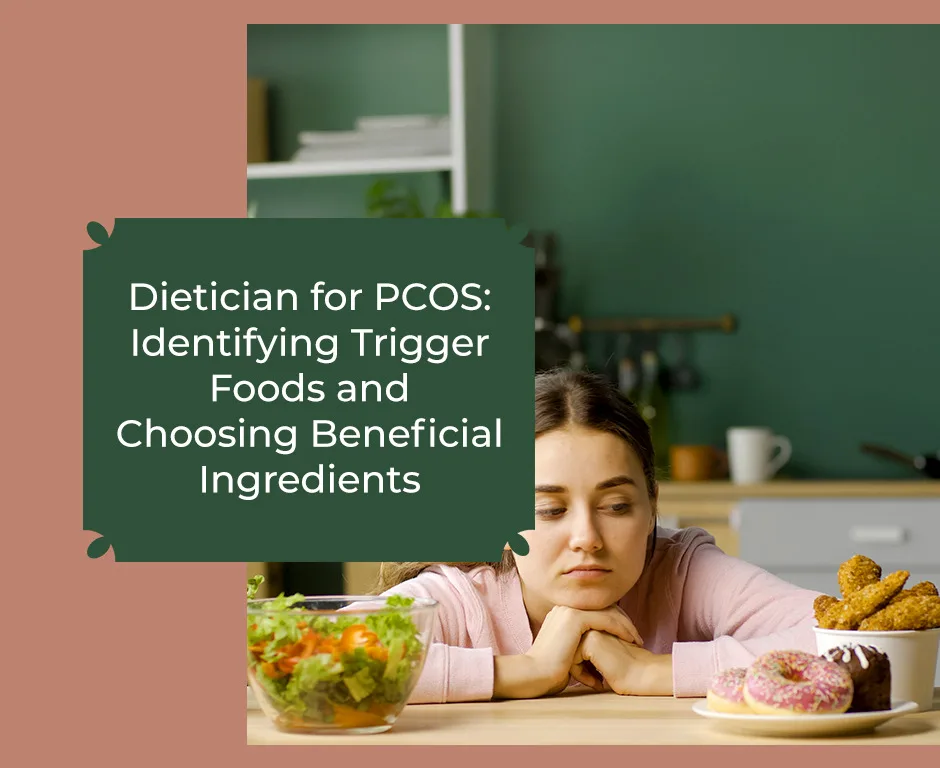Polycystic Ovarian Syndrome, also known as PCOS is a common hormonal disorder with over 1 million cases per year in India. Although it is widespread among women, there’s massive stigma and confusion around the treatment and the PCOS diet plan that needs to be followed to minimize its adverse effects. A healthy diet is a foundation for a healthy life and that becomes even more important when someone is diagnosed with PCOS. A balanced diet helps keep the hormonal balance in check and regulates insulin levels.
Since the effects of PCOS are different for everyone, no one diet can work for everyone. Therefore, it’s important to consult with a PCOS dietitian who can help you through this tumultuous journey. While diet may not be the complete solution, many studies show that if a person loses weight, their PCOS symptoms also improve. At the Health Studio, we have the aim of making healthy eating easy. Therefore, today we will identify trigger foods associated with PCOS and help you choose the most beneficial ingredients.
Trigger foods to avoid with PCOS
Processed Foods
Processed foods are like kryptonite if diagnosed with PCOS. It contains massive amounts of Glycaemic Index which is directly linked with increased levels of insulin production and we don’t want that. Women with PCOS have a high probability of developing diabetes and processed foods can greatly spike your blood sugar levels. A processed food-free diet is advisable for everyone. However, people with PCOS should avoid it completely. Some examples of processed foods are listed below
- White Bread
- Cakes
- White potatoes
- White rice
- Ready-to-make meals
Gluten
We have already covered that every person with PCOS will require a specialized PCOS diet as this condition isn’t the same for everyone. The same can be said for Gluten. Although people with PCOS aren’t gluten intolerant, many are advised to remove it from their diet to successfully manage it. Excessive consumption of Gluten can lead to inflammation and can increase the risk of developing diabetes. Gluten can also contribute to irregular weight gain which can further amplify the adverse effects of a condition like PCOS. Some gluten-based foods that people with PCOS should avoid are listed below.
- Soy sauce
- Cream sauces
- Doughnuts
- Pasta
- Cereals
Beneficial Ingredients for Managing PCOS Symptoms
Managing symptoms of a condition like PCOS can sometimes turn out to be a daunting task. However, with the help of a PCOS dietitian and the inclusion of some beneficial ingredients, one can greatly reduce their weight and battle PCOS at the same time. After covering what not to consume with PCOS, we will now talk about some beneficial ingredients that need to be a staple in a PCOS diet plan.
Fiber Rich Foods
Just like Gluten and Processed Foods can increase the blood sugar level in our body. Fiber-rich foods work completely in the opposite way. These foods can regulate insulin levels while giving you the much-needed energy that can get you through the day. A diet rich in fiber can also help curb all those late-night cravings and visit those infamous delivery apps. Foods rich in fiber include vegetables, fruits, whole grains, and legumes. These foods can also help curb the risk of getting diabetes and can lead to a healthy life
Healthy Fats
While we are on the subject of a healthy life, it is essential to incorporate healthy fats in your diet. A PCOS nutritionist will always include Omega-3 and monounsaturated fats to reduce inflammation and regulate hormonal levels. Healthy fats like Avocado, flaxseeds, and olive oil can serve as a great replacement to those unhealthy fats that are consumed by the majority of people.
Anti-Inflammatory Foods
As the word suggests Anti-Inflammatory foods help reduce inflammation in the body which is usually high when suffering from the symptoms of PCOS. Some examples of these foods include.
- Tomatoes
- Kale
- Spinach
- Almonds
- Olive Oil
Conclusion
When encountering a condition like PCOS, it can get a bit overwhelming at first. After careful research and planning, a determined individual can completely regulate this condition. However, consulting a specialized PCOS dietitian should be the first step in battling this condition. A dietitian can help you with a specialized PCOS diet plan tailored to your needs and lifestyle. A personal dietitian can also help with accountability which will in return help you reach your goals faster. PCOS is a condition that should be dealt with proactively as it worsens when nothing changes. Therefore, book an appointment with the Health Studio and take charge of your battle against PCOS.






